Removal Procedure
Tools Required
Caution: Unless directed otherwise, the ignition and start switch must be in the OFF or LOCK position, and all electrical loads must be OFF before servicing
any electrical component. Disconnect the negative battery cable to prevent an electrical spark should a tool or equipment come in contact with an exposed electrical terminal. Failure to follow these precautions may result in personal injury and/or damage to
the vehicle or its components.
- Disconnect
the negative battery cable.
- Drain and recover the coolant. Refer to
Cooling System Draining and Filling
in Engine Cooling.
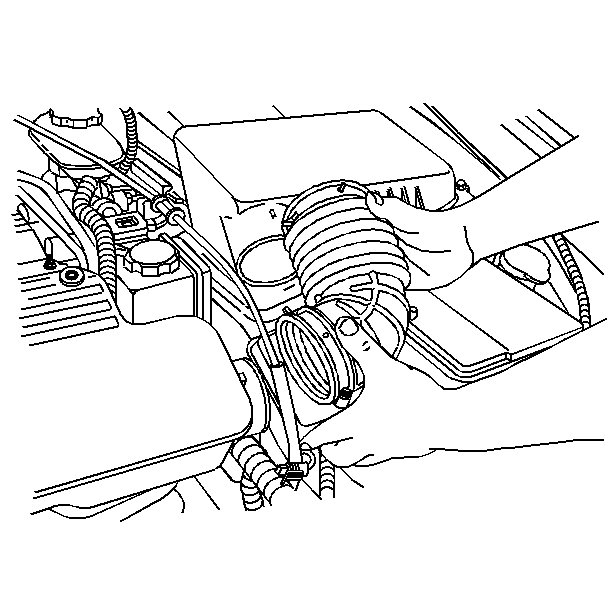
- Remove the duct between
the throttle body and the air cleaner.
- Remove the heater inlet and the throttle body hose from the water
outlet.
- Remove the power brake vacuum hose from the throttle body.
- Disconnect the following electrical connections:
| • | The manifold absolute pressure (MAP) sensor |
| • | The evaporative emission (EVAP) canister purge solenoid |
| • | The camshaft position sensor |
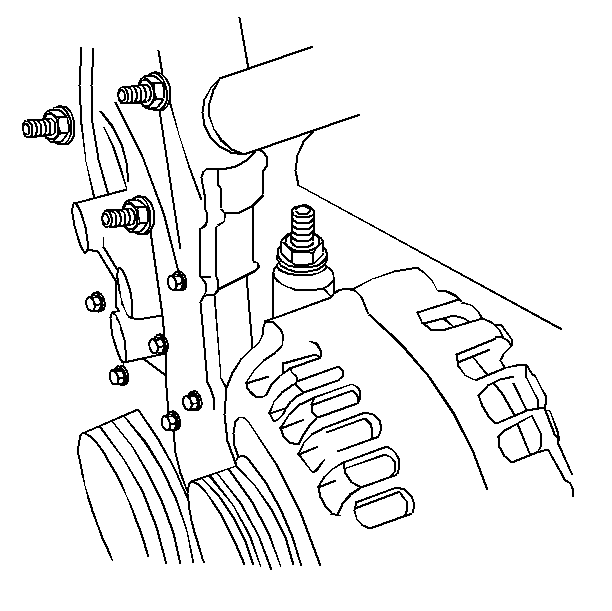
- Remove the generator stud-ended
bolt.
- Remove the intake manifold. Refer to
Intake Manifold Replacement
.
- Install the generator stud-ended bolt.
- Install the J 28467-360
. Refer to
Engine Support Fixture
.
- Remove the exhaust manifold. Refer to
Exhaust Manifold Replacement
.
- Remove the ignition coil and module assembly. Refer to
Ignition Coil Replacement
in Engine Controls
- 2.4L.
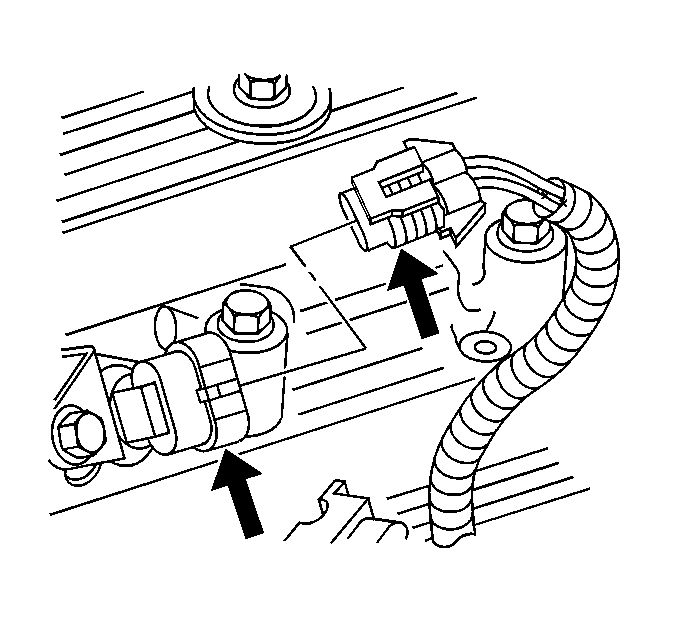
- Disconnect the camshaft
position sensor connector.
- Remove the power steering pump. Refer to
Power Steering Pump Replacement
in Power
Steering System.
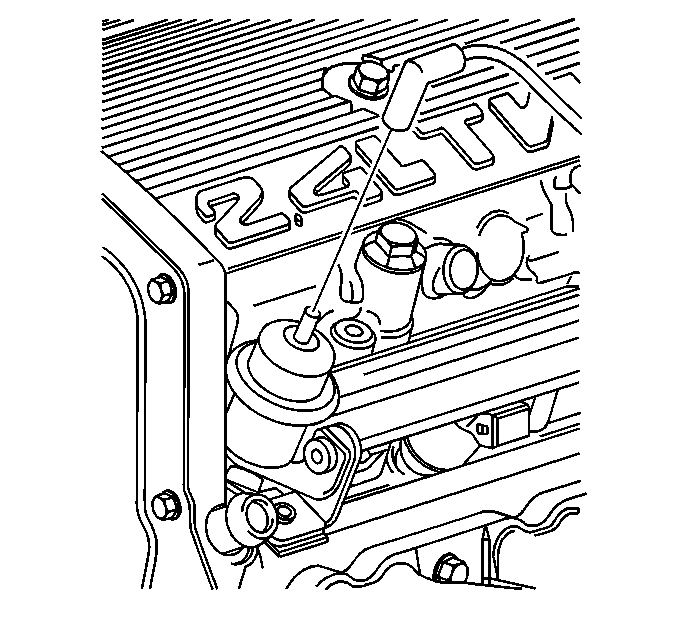
- Disconnect the vacuum
line from the fuel pressure regulator and the fuel injector harness connector.
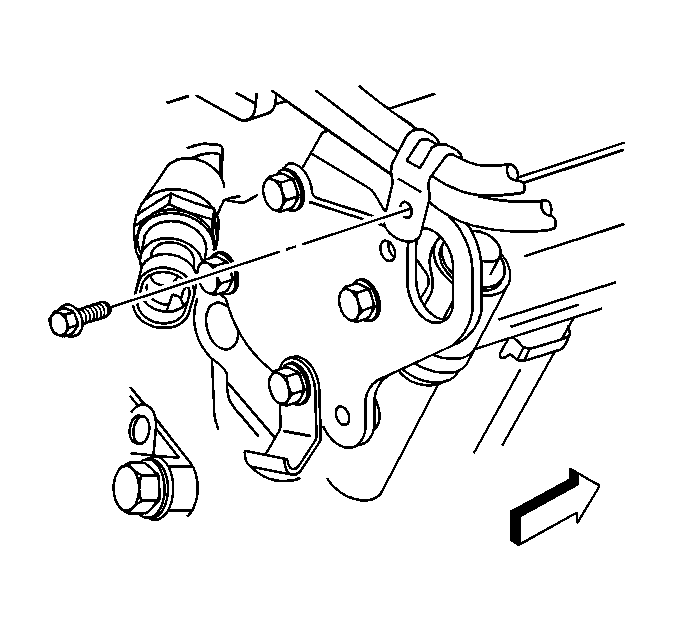
- Remove the fuel line retaining
clamp from the bracket on top of the intake camshaft housing.
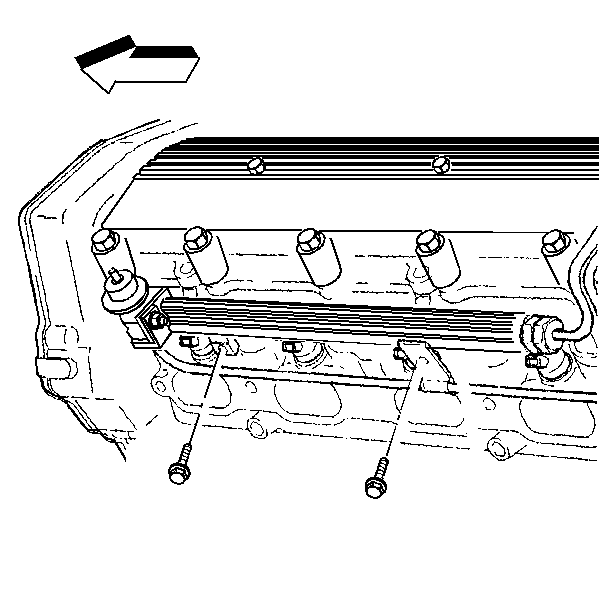
- Remove the retaining bolts
which secure the fuel rail to the camshaft housing.
- Remove the fuel rail from the cylinder head.
- Cover the injector openings in the cylinder head.
- Cover the injector nozzles.
- Leave the fuel lines attached and position the fuel rail aside
(on top of the master cylinder).
- Remove the timing chains and sprocket. Refer to
Camshaft Timing Chain, Sprocket, and Tensioner Replacement
.
- Remove the water pump. Refer to
Water Pump Replacement
in Engine Cooling.
- Remove the intake camshaft housing and camshaft. Refer to
Intake Camshaft, Housing and Lifter Replacement
.
- Remove the exhaust camshaft housing and camshaft. Refer to
Exhaust Camshaft, Housing and Lifter Replacement
.
- Remove the lifters. Refer to
Exhaust Camshaft, Housing and Lifter Replacement
.
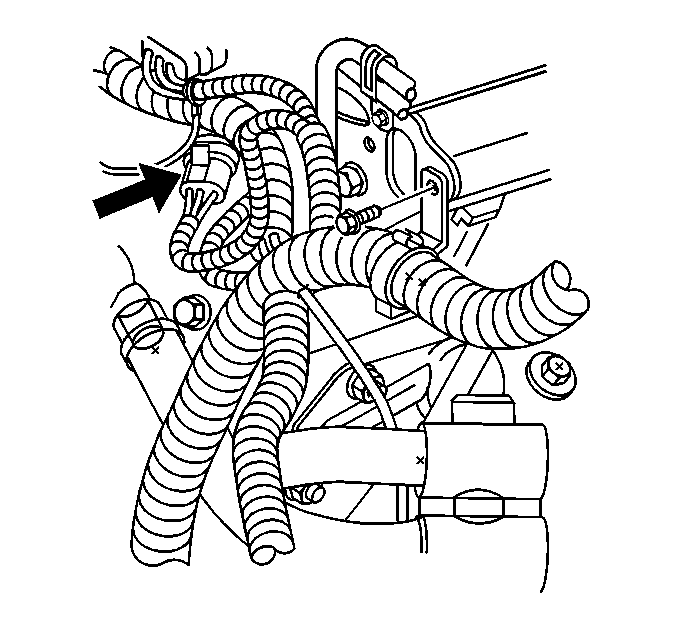
- Disconnect the electrical
connection from the oil pressure switch.
- Disconnect the radiator inlet (upper) hose from the coolant outlet.
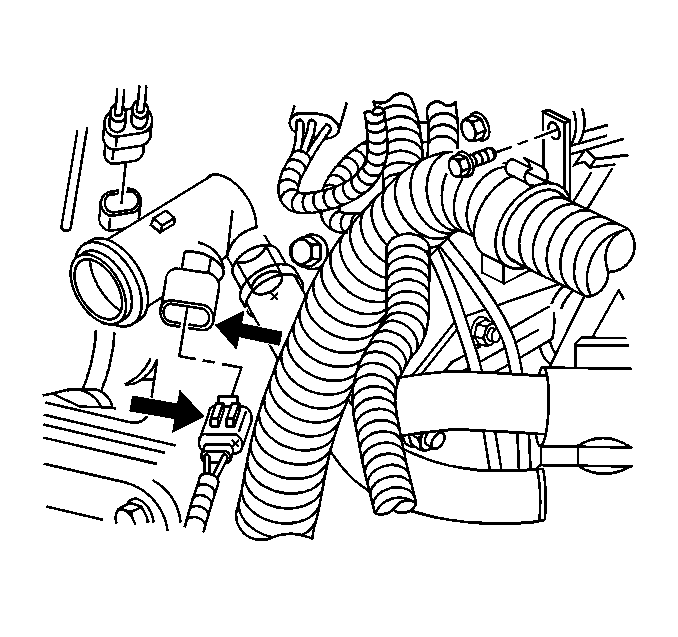
- Disconnect the coolant
temperature sensor connectors.
- Remove the cylinder head. Refer to
Cylinder Head Removal
.
Installation Procedure
Tools Required
- Install the cylinder and the gasket. Refer to
Cylinder Head Removal
.

- Connect the coolant temperature
sensor connectors.
- Connect the radiator inlet (upper) hose to the coolant outlet.

- Connect the electrical
connection to the oil pressure switch.
- Install the lifters. Refer to
Exhaust Camshaft, Housing and Lifter Replacement
.
- Install the exhaust camshaft housing. Refer to
Exhaust Camshaft, Housing and Lifter Replacement
.
- Install the intake camshaft housing. Refer to
Intake Camshaft, Housing and Lifter Replacement
.
- Install the water pump. Refer to
Water Pump Replacement
in Engine Cooling.
- Install the timing chain housing and the timing chain. Refer to
Timing Chain Housing Replacement
.
- Uncover the injector nozzles.
- Uncover the fuel injectors openings in the cylinder head.
- Install the fuel rail to the cylinder head.

- Install the retaining
bolts which secure the fuel rail to the camshaft housing.

- Install the fuel line
retaining clamp from the bracket on top of the intake camshaft housing.

- Connect the vacuum line
to the fuel pressure regulator and the fuel injector harness connector.
- Install the fuel rail and the fuel injectors. Refer to
Fuel Injection Fuel Rail Assembly Replacement
.
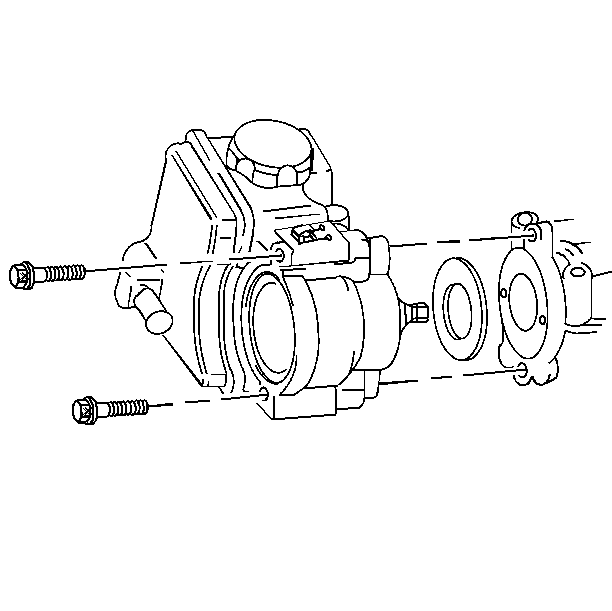
Important: Before you reinstall the power steering pump, apply a 3-mm bead of GM
P/N 12346586 sealer or the equivalent to the joint at the end of the
camshaft housing halves.
- Install the power steering pump assembly. Refer to
Power Steering Pump Replacement
in Power
Steering System.
Notice: Use the correct fastener in the correct location. Replacement fasteners
must be the correct part number for that application. Fasteners requiring
replacement or fasteners requiring the use of thread locking compound or sealant
are identified in the service procedure. Do not use paints, lubricants, or
corrosion inhibitors on fasteners or fastener joint surfaces unless specified.
These coatings affect fastener torque and joint clamping force and may damage
the fastener. Use the correct tightening sequence and specifications when
installing fasteners in order to avoid damage to parts and systems.
- Install the power
steering bolt.
Tighten
Tighten the bolt to 26 N·m (19 lb ft).

- Connect the camshaft position
sensor connector.
- Connect the electrical connector to the ignition coil and to the
module assembly. Refer to
Ignition Coil Replacement
in Engine Controls - 2.4L.
- Install the exhaust manifold. Refer to
Exhaust Manifold Replacement
.
- Remove the J 28467-360
. Refer to
Engine Support Fixture
.
- Remove the gnerator stud - ended bolt.
- Install the intake manifold. Refer to
Intake Manifold Replacement
.

- Install the generator
stud - ended bolt.
- Connect the following electrical connections:
| • | The EVAP canister purge solenoid |
| • | The camshaft position sensor. |
- Install the power brake vacuum hose to the throttle body.
- Install the heater inlet and the throttle body hose to the water
outlet.

- Install the duct between
the throttle body and the air cleaner.
- Fill the coolant system. Refer to
Cooling System Draining and Filling
in Engine Cooling.
- Connect the battery cable.

















